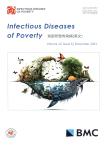Scaling up impact of malaria control programmes: a tale of events in Sub-Saharan Africa and People’s Republic of China
作者机构:National Institute of Parasitic DiseaseChinese Center for Disease Control and PreventionWHO Collaborating Centre on MalariaSchisostomiasis and FilariasisKey Laboratory of Parasite and Vector BiologyMinistry of Health207 Rui Jin Er RdShanghai 200025People’s Republic of China School of Medicine&PharmacyHoudegbe North American University PK10Route de Porto-Novo06 BP 2080CotonouRépublique du Bénin Department of Pharmacology and ToxicologyKampala International University Western CampusP.O.Box 71IshakaBushenyiUganda
出 版 物:《Infectious Diseases of Poverty》 (贫困所致传染病(英文))
年 卷 期:2012年第1卷第1期
页 面:61-75页
核心收录:
学科分类:1002[医学-临床医学] 100201[医学-内科学(含:心血管病、血液病、呼吸系病、消化系病、内分泌与代谢病、肾病、风湿病、传染病)] 10[医学]
基 金:This work was supported by National Institute of Parasitic Disease,Chinese Center for Disease Control and Prevention,Shanghai 200025,Ministry of Science and Technology,Ministry of Human Resources and Social Security of P.R.China P.R.China Postdoctoral Science Foundation,P.R.China-Africa Sciences and Technology Partnership Program,2011 Thanks to the partial support of the Chinese National Science and Technology Major Program(2012ZX10004220)
主 题:malaria funding scaling up interventions health system Sub-Sahara Africa People’s Republic of China
摘 要:This review aims at providing synthetic information with scientific evidence on the trends in the malaria events from 1960 to 2011,with the hope that it will help policy makers to take informed decisions on public health issues and intervention designs on malaria control towards elimination in both Sub-Sahara Africa and in the People’s Republic of China by highlighting the achievements,progress and challenges in research on moving malaria from epidemic status towards *** findings showed that since 1960,malaria control programmes in most countries have been disjointed and not ***,during the last decade,the causal factors of the unprecedented and substantial decline in malaria morbidity and mortality rates in most vulnerable groups in these endemic areas are multifaceted,including not only the spread of malaria and its related effects but also political and financial willingness,commitment and funding by governments and international *** benefits of scaling up the impact of malaria coverage interventions,improvement of health system approaches and sustained commitment of stakeholders are highlighted,although considerable efforts are still necessary in Sub-Sahara ***,novel integrated control strategies aiming at moving malaria from epidemic status to control towards elimination,require solid research priorities both for sustainability of the most efficient existing tools and intervention coverage,and in gaining more insights in the understanding of the epidemiology,pathogenesis,vector dynamics,and socioeconomic aspects of the *** conclusion,political commitment and financial investment of stakeholders in sustaining the scaling up impact of malaria control interventions,networking between African and Chinese scientists,and their Western partners are urgently needed in upholding the recent gains,and in translating lessons learnt from the Chinese malaria control achievements and successes into practical interve



